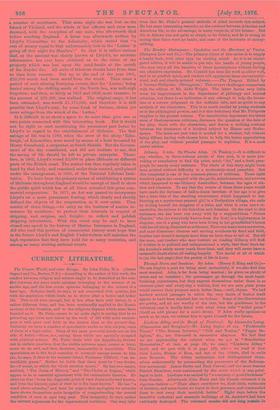CURRENT LITERATURE.
The Unseen World, and other Essays. By John Fiske, MA. (James Osgood and Co., Boston, U.S.)—According to the author of this work, the conflict between religion and science ought to be described as the-con- flict between the more crude opinions belonging to the science of an earlier age, and the less crude opinions belonging to the science of a later age. Religion itself, he says, is not concerned with opinion, but with the aspiration which leads us to strive after a better and holier life. This is all true enough, but it has often been said before, in a rather different form, and has been continually applied to the Mosaic account of the Creation, and to the religions dogmas which some have founded on it. Mr. Fiske seems to us quite right in saying that in no preceding age have men taken up the work of life with more earnest- ness or with more real faith in the unseen than at the present day. Certainly we have a number of speculative works on this subject, some of them of a high order. Many of the most powerful minds are on the side of belief,—those, too, among them which are specially occupied with physical science. Mr. Fiske deals with the hypothesis, thrown out in certain quarters, that the visible universe must, sooner or later, come to an end, and that, therefore, immortality is impossible. This speculation as to the final cessation of coemioal energy seems to him (as, he says, it does to his eminent friend, Professor Clifford) "an un- verifiable guess." Rather he holds that there must be "one divine, far-off event, to which the whole creation moves." He has two essays, entitled, The Jesus of History" and "The Christ of Dogma," which appear to be in essential agreement with the rationalistic theories. He observes that "from the dogmatic point of view Jesus is the best known, and from the historio point of view he is the least known." He has " a word about miracles," and here he argues that apologists for miracles have shown themselves quite incapable of comprehending the mental condition of man in ages long past. This incapacity, he says, makes the current arguments for the supernatural worthless. One may infer
from this Mr. Flake's general attitude of mind towards this subject. He has some interesting remarks on the contrast between Athenian and American life, to the advantage, in many respects, of the former. BO life at Athens was not quite so simple as he thinks, and he is wrong in saying that there were no banks, and none of the incidents of money- making.


































 Previous page
Previous page